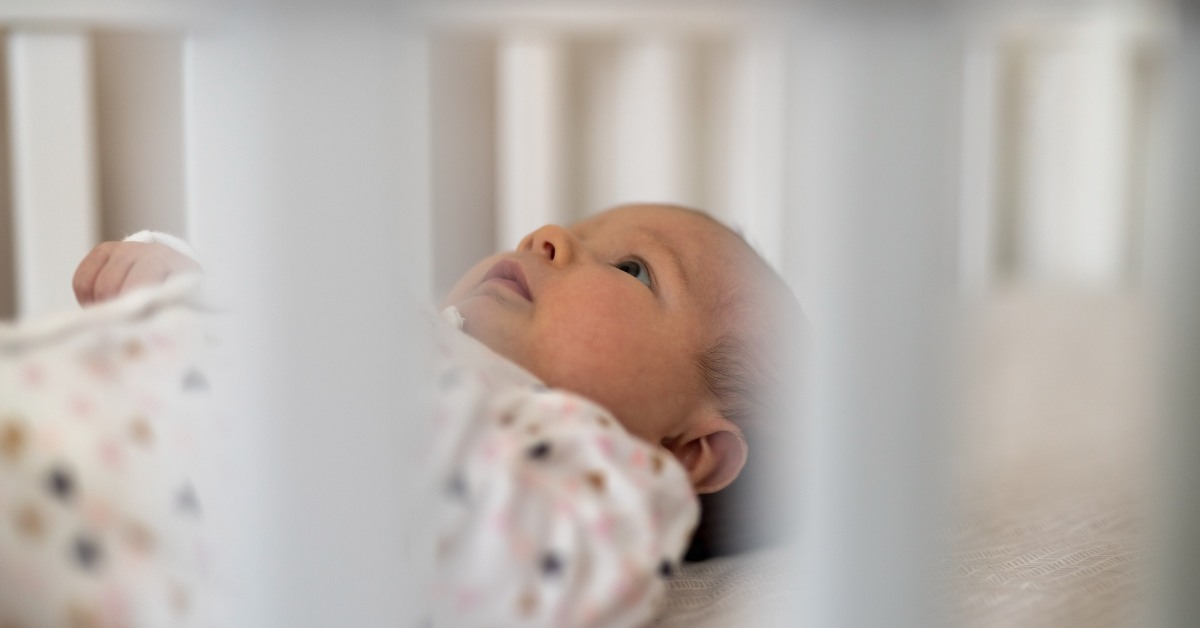What if a 3-month-old won’t sleep in their crib? When your baby is 3 months old, many moms and dads are really exhausted and long for better sleep. Trying to get the baby to fall asleep and stay asleep in the crib feels like a great idea. Well, not according to the baby!
Why does a 3-month-old baby refuse crib sleeping, and what can be done about it?
Mom’s Question:
My 3-month-old baby will not sleep in his crib…
I allowed him to sleep with us for what I thought was going to be only a month or so…. but for the last 2 weeks, I have been trying to get him to sleep alone in his crib…and, it will not work…
It is like the second he hits the sheets, he wakes up… and I leave him in there for a little while, but by 15-20 mins he is crying… but yet if I put him by himself in my bed, he will sleep alone…
Please, some help…
Hallie
3-Month-Old Baby Refuses The Crib; Why and What to Do?
Reasons Why a Three Months Old Baby May Refuse Crib Sleeping
The Sleep Pattern of a 3-Month-Old
For a start, your baby is still very young. At three months, babies tend to sleep for around 15 hours per day, but their sleep pattern is still irregular and unpredictable. One night, they may sleep for longer stretches, and you may start hoping and believing that this is the new normal, and then suddenly, they start waking up very often again. This does not mean that you did anything wrong or that there is something wrong with your baby. It is simply a normal variation at this age.
It is common and normal for a 3-month-old baby to wake up during the night for feeding. They may need three night-feedings at this age and may very well wake up even more often than that.
Difficulty falling asleep independently
Many 3-month-old babies rely on sleep associations, such as being rocked or fed, to be able to fall asleep, or they need the warmth and smell of their mom or dad. This can lead to difficulties when they wake up during the night and need those same associations to fall back asleep.
Sleep Regression
Around three months old, some babies may experience a period of less predictable sleep. These periods of sliding backward regarding sleep predictability and length of undisturbed sleep are often called “sleep regression”. A sleep regression is a temporary phase where a baby suddenly wakes up more and has difficulty settling back to sleep. While not really backed up by research as a “true” phase or phenomenon, babies and young children certainly have periods when they wake up more. Four months is often mentioned as a typical sleep regression phase, but it can happen at three months too.
A lot of things happen with a baby’s development at three months, and development leaps are often associated with disturbed sleep.
Aware of Their Surroundings and Routine Lovers
Sometimes, it is actually easier to get a newborn baby to sleep in the crib than one that is a little bit older. At three months, babies have generally bonded well with their primary caregivers; they are social and smiling and may already have started to become used to some routines. Changing the routines at this point (and onward) can therefore lead to protests. Who wants to sleep in a cold crib when mom’s or dad’s arms are an option..?
How To Transit Baby To Crib
It is pretty common for babies to refuse to sleep in their cribs. The mattress is not as soft, it doesn’t smell mom, it is colder, it’s simply different… (=worse according to the baby).
Also, babies are routine lovers, and changes, in general, can be challenging for them. When the change is to be further away from mom and dad, then there is nothing positive with it from your son’s perspective. He might even be scared!
Transitioning a 3-month-old baby from co-sleeping to their own crib will be easier if you make it a gradual process and realize that it may take patience and consistency.
Here are some tips that you can try:
A Sleep Routine
If you haven’t already, try establishing a consistent bedtime sleep routine that, after a while, will signal sleep time for your baby. The routine can, for example, include a bath, baby massage, a specific song while putting on the pajama, or anything else that feels soothing and possible to maintain over time. It doesn’t have to be advanced. It helps if the routine ends in the room where you want your baby to sleep, whether it’s a crib in your room or their own room. (Being only three months old and still at a heightened risk of SIDS, sleeping in their parents’ room is recommended.)
The Sleep Environment
Create a sleep-friendly environment that is both safe and comfortable. Remove any soft bedding or objects that could pose a suffocation hazard while at the same time ensuring that the bed is not too spacious (from your baby’s perspective). Many young babies sleep better in more narrow spaces, so either consider swaddling or firmly rolling blankets to make the mattress space somewhat smaller and create a “nest” for your baby. If you put a sheet over the rolled blankets and tuck it snugly, you avoid the risk that your baby gets a blanket over their face or that they can roll towards a blanket or pillow with their face.
Start with the Naps
In my experience, it is easier to start the transition to the crib with the naps. I am not really sure why this is; maybe because we parents are less tired. Also, breaking the habit of sleeping in mom’s arms is a great start. For this purpose, stroller walks are an excellent option. Once your baby falls asleep well for naps in the stroller, you can start with the crib as the next step. You can also try to gently move your baby from the stroller to the crib for naps once they appear to be in a deep sleep.
Having your baby nap in the crib during the day will help them become familiar with the crib and associate it with sleep.
Increase the Space Between Your baby And You Gradually
When you believe that your baby may be ready to learn to fall asleep without being in your arms, start to gradually increase the space between the two of you. You can lie down on the bed together but literally move away while keeping your arm close to your baby. Then move further away. Then put your baby in the crib, but almost hold them at first. Then after a few days, start moving away.
This way, your little routine love will slowly learn to fall asleep in the crib.
Quick Response at Night
When your baby has started to sleep in the crib at night, try to respond quickly when they wake up, especially in the beginning. If they are awake and unable to fall asleep, they are most likely going to be sad and wide awake and a lot harder to soothe.
I have collected a number of tips on how to help a baby accept crib sleeping. Have you had a look at those? You’ll find the crib sleeping tips. If this doesn’t help you, get back to me!
Paula
More Babies That Refuse Crib Sleeping
- 8-Month-Old Baby Won’t Sleep In Crib
- Newborn Baby Won’t Sleep In Crib
- 4 Month Baby Rejects Both Crib And Bassinet
- How Get Baby To Sleep At Daycare (When They Only Sleep In Your Arms)
Find comments below.
Research References
Mindell JA, Leichman ES, Composto J, Lee C, Bhullar B, Walters RM. Development of infant and toddler sleep patterns: real-world data from a mobile application. J Sleep Res. 2016 Oct;25(5):508-516. doi: 10.1111/jsr.12414. Epub 2016 Jun 2. PMID: 27252030.

Paula Dennholt founded Easy Baby Life in 2006 and has been a passionate parenting and pregnancy writer since then. Her parenting approach and writing are based on studies in cognitive-behavioral models and therapy for children and her experience as a mother and stepmother. Life as a parent has convinced her of how crucial it is to put relationships before rules. She strongly believes in positive parenting and a science-based approach.
Paula cooperates with a team of pediatricians who assist in reviewing and writing articles.








My son has slept in my bed with me since he came home from the hospital.I breastfeed so I found this to be very convenient. I don’t get my lil guy he will sleep ANYWHERE other than his crib and bassinet during the day time..At night i can put him in his bassinet sound asleep and within 3 min he is letting out a deaf defying cry. When i put him in bed with me i lay him in his sleep positioner wide awake with his binky and he falls asleep like there is nothing to it!! I don’t know what to do.. I’ve tried the whole letting him cry it out and cry himself to sleep and this did not work he cried for over an hour and it made me feel like a HORRIBLE MOTHER! So I picked him up and within 3 min he was sound asleep. Somebody, please help me!!
While I don’t agree with the method crying it out, simply because it breaks my heart to hear him cry, I don’t think that 15 minutes of crying is going to turn a baby into a serial killer. And I think that people who make you feel guilty for an already difficult thing are jerks.
I was looking for advice for the transition also but from people who can offer something besides judgment.
I am sorry that you feel judged by the below comment. We all have to make our choice to make daily life work for us. Did you read the tips for transitions to crib sleeping above? If not, start there to see if they provide some help for you. Good luck!
I did the same thing, had the baby sleep with me for “a month” which turned into 2, which turned into 3, etc. First of all, it WILL work out, don’t blame yourself or think you did anything wrong. Now that my 4 months old sleeps on his own, there are times that I miss having that little cuddle bug next to me… It was a great bonding time for us!
We used a bassinet (sp?) which seemed to be a smaller space for our son. Instead of a sheet (which I thought my feel too cold on his warm skin, I wrapped the mattress securely with a warm blanket. Then, I followed my pediatrician’s advice and put him to bed full, dry, and happy and let him cry. I was picking him up after 15-20 minutes like you, but the doctor said that he wouldn’t cry for much longer than that. HE WAS RIGHT! My son cried a bit the first few times, but after that, he stopped crying all together when I put him down. Now, he is not only sleeping on his own, but he also sleeps through the night and so do my husband and I.
Next step…the crib in his own room! Yikes:-0
I know that crying it out is frowned upon by some, and I used to agree, but it truly helped in our case and it only lasted 25 minutes at the longest and was only for 3-4 days.
Hope this helps!
CIO is WRONG. You ignored your very young baby’s cries for assistance and closeness with you when he needed it. That truly saddens me that this actually happens to these babies. I would hate to be ignored by my husband or anyone else close to me if I were crying and wanted someone there with me.